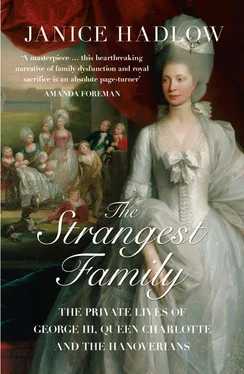If Prince George’s social and family life did little to equip him for the future, he was equally unprepared in almost every other practical dimension of kingship. As a young man, he was bitter about the failings he believed had left him so exposed. ‘I will frankly own,’ he wrote in 1758, ‘that through the negligence, if not wickedness of those around me in earlier days … I have not that degree of knowledge and experience of business one of my age might reasonably have acquired.’ 62His formal education had certainly been a haphazard affair. After Frederick’s death, it was underpinned by no coherent plan and driven by political considerations as much as by the desire to equip the boy with a foundation of useful knowledge. The king had replaced George’s tutors with his own appointees; only George Scott, who did most of the actual teaching, survived as part of the new team. As the prince’s governor, George II appointed his friend Simon, Earl Harcourt, a loyal courtier whose principal task was to ensure that the prince was encouraged neither to venerate nor to follow the policies of his dead father. He was otherwise undistinguished, memorably described by Walpole as ‘civil and sheepish’. 63Thomas Hayter, Bishop of Norwich, filled the role of preceptor. His pupil had nothing but contempt for him, describing him in later life as ‘unworthy … more fitted to be a Jesuit than an English bishop’. 64A third new appointment was Andrew Stone, who became sub-governor. Stone, like Harcourt, was a political choice; he was the fixer and general factotum of the Duke of Newcastle, who served regularly as George II’s first minister, and could be expected to pass back to St James’s detailed reports of events at Leicester House.
Under this top-heavy array, George and his brother Edward were set to work. Their lessons began at seven in the morning, and ranged, as they had always done, well beyond the traditional curriculum. However, the more modern subjects – including science, which George particularly enjoyed – did not displace the traditional concentration on the classics. Caesar’s Commentaries remained a familiar if unwelcome feature of the princes’ daily routine, much to George’s frustration. ‘ Monsieur Caesar ,’ he wrote in the margins of one of his laborious translations, ‘ je vous souhaite au diable. ’ (‘I wish you to hell.’ 65) As his later life was to demonstrate, George had a lively mind, and as an adult would find pleasure in a wide range of intellectual pursuits; but he found little to engage his imagination in what he was taught as a boy. He lacked the aptitude to master ancient languages, and was, in general, poor at rote learning. His fascination for practical and mechanical tasks was regarded as further evidence of his intellectual dullness. Only in music did he shine, playing the German flute with self-absorbed pleasure. All the siblings were accomplished amateur musicians, the girls singing and playing the harpsichord. The love of music was one of the few passions he shared with his father, and one which would outlast his sanity. In all other areas of educational endeavour, especially those that required feats of memory, George was generally regarded as a failure, his apathy and inattention exasperating his instructors.
Augusta knew, as did almost everyone else in the political world, that her eldest son was not making the progress expected of him: ‘His education had given her much pain. His book-learning she was no judge of, but she supposed it small or useless.’ 66She thought her sons had not been well served by their instructors. Bishop Hayter may have been ‘a mighty learned man’, but he did not seem to Augusta ‘to be very proper to convey knowledge to children; he had not the clearness she thought necessary … his thoughts seemed to be too many for his words’. 67She told Dodington that she had repeatedly attempted to challenge Lord Harcourt directly about what was happening, but he simply avoided her. She finally cornered him one night at St James’s, ‘and got between the door and him, and took him by the coat’; even then the slippery earl escaped her grasp with a platitude. She disliked Harcourt, not only for his elusiveness, but because he ‘always spoke to the children of their father and his actions in so disrespectful a manner as to send them to her almost ready to cry’. 68
Stone, in contrast, ‘always behaved very well to her and the children and though it would be treason if it were to be known, always spoke of the late prince with the greatest respect’. 69But even he seemed to have a curious idea of what was required of him. ‘She once desired him to inform the prince about the constitution,’ wrote Dodington, ‘but he declined it, to avoid giving offence to the Bishop of Norwich. That she had mentioned it again, and he had declined it, as not being his province.’ When Dodington asked Augusta what Stone’s province was, ‘she said she did not know, she supposed to go before him upstairs, to walk with him, sometimes seldomer to ride with him and then to dine with him’. 70
George’s tutors had reason to be nervous when called upon to offer interpretations of the constitution to the heir to the throne. At the end of 1752, Harcourt and Hayter turned on their colleagues Stone and Scott and accused them of Jacobite sympathies, claiming they were covertly indoctrinating George with absolutist principles. They offered no real evidence for their charges, and could persuade neither the king nor his first minister, Newcastle, to believe them. Both promptly resigned, but the recriminations surrounding the affair dragged on for over a year, and were not resolved until Stone had appeared before the Privy Council and the matter had been raised in the House of Lords. It was easy for Dodington to declare with passion that ‘what I wanted most was that his Royal Highness should begin to learn the usages and knowledge of the world; be informed of the general frame and nature of government and the constitution, and the general course and manner of business’. 71But, as the cautious Stone had understood when he refused Augusta’s direct invitation to do just that, attempting the political education of princes was a far riskier undertaking than teaching them Latin.
With the departure of Harcourt and Hayter, the king was determined to make one last effort to turn his fourteen-year-old grandson into the kind of heir he thought he deserved. Prince George’s hesitant and self-conscious appearances at the formal Drawing Rooms did not impress his grandfather, who had forgotten many of the tender professions he had made at the time of Frederick’s death. Unless taken in hand, he feared the prince would be fit for nothing but to read the Bible to his mother. He approached James, Earl Waldegrave, who had been a Lord of the Bedchamber in his household, and asked him to become the prince’s new governor. Confident, experienced and expansive, Waldegrave was a very different character from the ineffectual Harcourt, and his sophisticated presence introduced an unfamiliar flavour into Augusta’s circle. At first, everyone seemed to welcome both it and him, and Waldegrave used this early advantage to effect something of a revolution in the prince’s education. He recognised immediately that the most important task was to engage George’s fitful attention, and sought to do this by offering him a vision of knowledge that went beyond the traditional forms of learning his pupil found so unengaging. ‘As a right system of education seemed impossible,’ Waldegrave recalled in his Memoirs , ‘the best which could be hoped for was to give him true notions of common things; to instruct him by conversation, rather than books; and sometimes, under the disguise of amusement, to entice him to the pursuit of more serious studies.’ 72
Читать дальше












